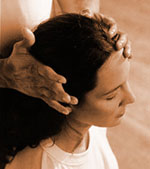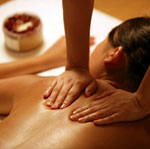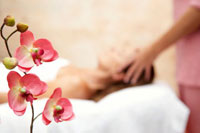SWEDISH MASSAGE

Swedish Massage is recognised as the first systematic method of modern massage
in the Western world and remains one of the most popular massages for the first-time
spa goer. The massage typically uses a medium of vegetable oil, cream and sometimes
talc and includes long strokes or effleurage, kneading, friction, vibrations
and stimulating movements also known as tapotement using the hands, palms, thumbs
and fingertips. Movements are generally applied in the direction of the heart
and the main purpose is to increase the oxygen flow in the blood and release
toxins from the muscles. By increasing blood flow the muscles are warmed and
relaxed and the recovery time from muscular strain is shortened by the flushing
out from the tissues of lactic acid, uric acid and other metabolic wastes. Skin
tone is improved and due to the stimulation of the lymphatic system cellulite
can be reduced. In addition, by stimulating the nervous system there is a reduction
in both emotional and physical stress. Swedish Massage is both relaxing and
invigorating. It affects the nerves, muscles, glands and circulation, while
promoting health and well-being.
TUI NA
Tui Na is an Oriental bodywork therapy that has been used in China for 2,000
years. It uses the traditional Chinese medical theory of the flow of qi through
the meridians as its basic therapeutic orientation. Tui Na is a varied technique
that uses many different strokes such as rolling, pressing, kneading, plucking
and vibrations that are applied to acupoints, channels and muscle groups.
When done correctly there is an exchange of qi energy between the practitioner
and the patient, resulting in ultimate healing. Through the application of
massage and manipulation techniques Tui Na focuses on the flow of qi through
the system of channels, allowing the body to naturally heal itself. Tui Na
methods include the use of hand techniques to massage the soft tissue of the
body, acupressure techniques to directly affect the flow of qi and manipulation
techniques. As with Shiatsu and Thai Massage, the client wears loose clothing
and lies on a table or floor mat. Sessions last from 30 minutes to one hour.
Tui Na is recommended for the treatment of specific musculo-skeletal disorders
and chronic stress-related disorders of the digestive, respiratory and reproductive
systems.
AYURVEDIC MASSAGE
Ayurveda, the 5,000-year-old holistic healing tradition from India encompassing
mind, body and spirit, is based on the Sanskrit word ayar meaning “life”
and veda meaning “knowledge”. Three doshas are central to the
Ayurvedic philosophies – vata, pitta and kapha – each one representing
specific physical and emotional trends. Abhyanga (Ayurvedic oil massage) is
an integral part of the daily routine traditionally performed in the morning
and is recommended by this healing system for overall health and well-being.
Ayurveda is nourishing, relieves fatigue, provides stamina and is beneficial
in treating rheumatism, induces sound sleep and gives a sense of well-being.
Traditionally Abhyanga is a synchronised massage performed by two therapists.
It is a procedure in which medicated oil, prepared using herbs that pacify
the unbalanced vata, pitta and kapha energies, is applied to the whole body
and massaged in a specific manner by two therapists.
INDIAN HEAD MASSAGE
Indian Head Massage, otherwise known as Champissage (Champi), has been practiced
for over a thousand years as a tradition of family grooming and is part of the
Ayurvedic form of healing and relaxation. Originally, it was developed by women
who used different oils according to the season to keep their hair strong, lustrous
and in beautiful condition. Indian Champissage incorporates deep thumb and finger
pressure and friction as well as soothing stroking focusing on the neck and
shoulders where stress affects major muscle groups. Indian Head Massage can
also work through the upper arms, scalp and face. Muscular tension is relieved,
blood and lymphatic circulation is increased, toxins are dispersed from tense
muscles and flexibility and fluidity of movement is restored. It helps to relieve
headaches, eye strain and sinusitis, focuses concentration and improves sleeping
patterns. Close to the end of each treatment, a deeper sense of relaxation is
induced and the client’s energy level is improved. Champissage can also
release locked emotions and negative energy, making room for positive feelings.
SPORTS MASSAGE
 The growth in the number of people taking regular exercise has also led to a
higher incidence of minor injuries caused by over exercising or undertaking
a too strenuous workout. To redress the balance, there is a growing interest
in Sports Massage which has been developed to both help prevent injury in the
first place but also promote quick recovery from minor sporting injuries. Sports
Massage can play a part in pre-sport, post-sport and in-between exercise or
sports activities. This massage shortly before or after an activity will decrease
the likelihood of strained or sore muscles and the long-term risks of strain
and potential injury are reduced. The specialist technique tends to be strong
and deep to really work on the muscle tissue. However, the depth of pressure
applied will vary according to the purpose of the treatment. Massage movements
are similar to those used in Swedish Massage and include stroking, kneading,
compression, friction and tapotement. The effect is relaxing and regenerating
to help keep the body in peak condition. The massage can be applied with oil
or cream and some practitioners may even use talc. The growth in the number of people taking regular exercise has also led to a
higher incidence of minor injuries caused by over exercising or undertaking
a too strenuous workout. To redress the balance, there is a growing interest
in Sports Massage which has been developed to both help prevent injury in the
first place but also promote quick recovery from minor sporting injuries. Sports
Massage can play a part in pre-sport, post-sport and in-between exercise or
sports activities. This massage shortly before or after an activity will decrease
the likelihood of strained or sore muscles and the long-term risks of strain
and potential injury are reduced. The specialist technique tends to be strong
and deep to really work on the muscle tissue. However, the depth of pressure
applied will vary according to the purpose of the treatment. Massage movements
are similar to those used in Swedish Massage and include stroking, kneading,
compression, friction and tapotement. The effect is relaxing and regenerating
to help keep the body in peak condition. The massage can be applied with oil
or cream and some practitioners may even use talc.
| < Prev Page | 1 | 2 | 3 | |
|

